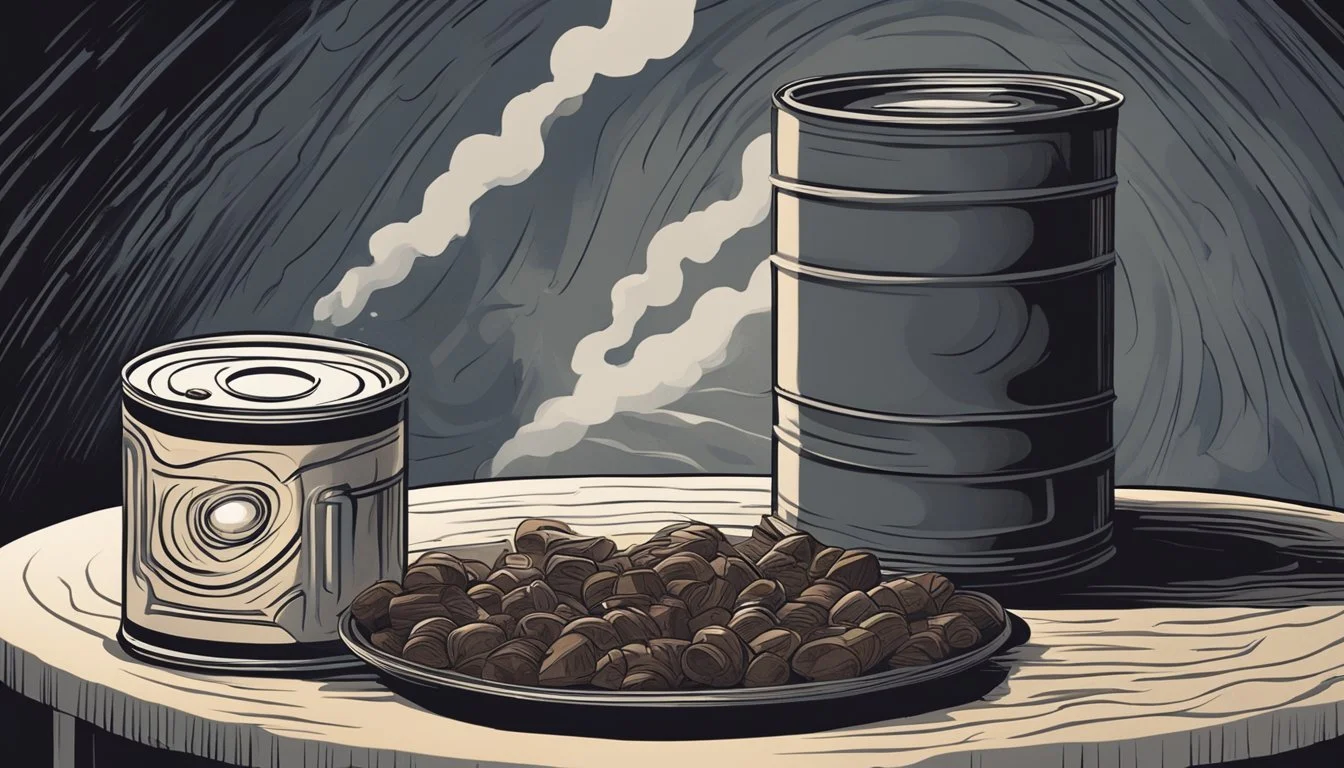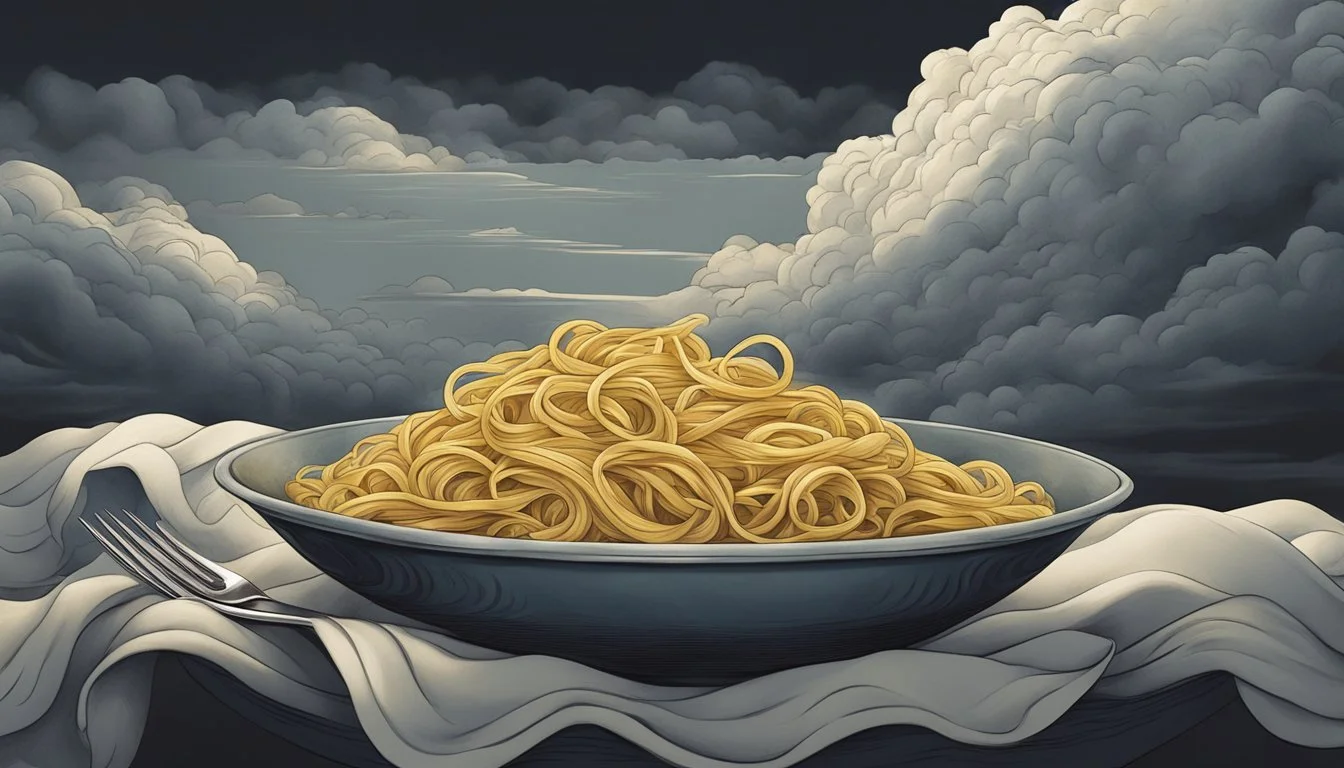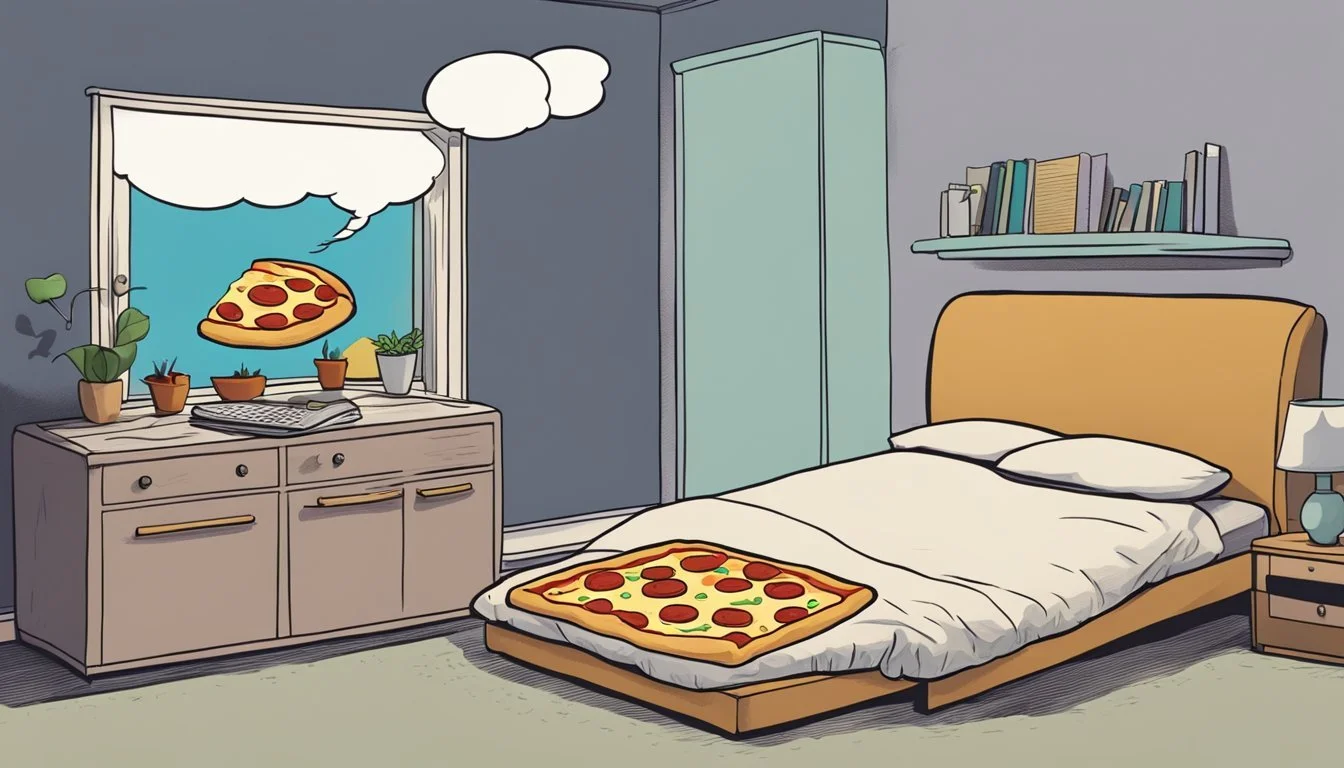10 Foods That Can Cause Bad Dreams
Uncover the Surprising Culprits
Many people experience various types of dreams, some pleasant and others more distressing. Sleep quality and dream patterns can be influenced by multiple factors, including the types of foods consumed before bedtime.
Understanding which edibles might contribute to unsettling dreams can help in making more informed dietary choices, particularly later in the day. This article explores ten specific foods that could potentially cause bad dreams.
1) Cheese
Cheese is often mentioned as a potential cause of vivid or unusual dreams. This belief is rooted in anecdotal evidence and has been the subject of various studies.
One theory points to the amino acid tryptophan, found in cheese. Tryptophan is a precursor to serotonin, a neurotransmitter that plays a role in regulating sleep and mood.
Some research suggests that dairy products, including cheese, could potentially influence dream patterns. Surveys have indicated that people often report more bizarre or disturbing dreams after consuming cheese before bedtime.
A study conducted by the British Cheese Board tested this theory and found no significant increase in nightmares. However, participants did report experiencing more vivid dreams, suggesting a possible link.
Cheese's impact on dreams could also be related to its effect on digestion. Eating cheese late at night may cause discomfort or digestive issues that can disrupt sleep, potentially leading to more vivid dreams.
While scientific evidence is still inconclusive, the connection between cheese and unusual dreams remains a popular topic of discussion. It appears that while cheese may not necessarily cause bad dreams, it might contribute to more vivid and memorable ones.
2) Spicy Foods
Spicy foods, including items like hot sauce and chili peppers, have been frequently linked to disruptive sleep and vivid dreams. Studies indicate that people consuming spicy foods before bed often report higher incidences of stressful or disturbing dreams.
The reason behind this could be related to how spicy foods affect the body's temperature regulation. The consumption of these foods can cause an increase in body temperature, which might lead to more restless sleep and unusual dreams.
Additionally, spicy foods can sometimes cause indigestion or gastrointestinal discomfort, further impeding restful sleep. When the body is uncomfortable, the brain is more active, potentially resulting in strange or intense dreams.
While not everyone is affected in the same way, it is clear that for some people, eating spicy foods close to bedtime can alter their sleep experience, making their dreams more vivid and memorable.
3) Chocolate
Chocolate, especially dark chocolate, contains both caffeine and theobromine. These compounds can stimulate the nervous system, potentially disrupting sleep patterns.
Caffeine levels in chocolate can vary. For instance, 100 grams of dark chocolate contain about 43 mg of caffeine. This is much less than a cup of coffee, which typically contains around 80-100 mg.
Eating chocolate close to bedtime might increase alertness. This can make it harder to fall asleep, increasing the chances of experiencing vivid and unusual dreams.
Sugar content in chocolate also plays a role. High sugar intake can lead to spikes and drops in blood sugar levels, which might affect sleep quality and dream intensity.
4) Alcohol
Alcohol consumption can significantly impact sleep patterns and dream activity.
After drinking, the body experiences changes in rapid eye movement (REM) sleep. REM sleep is the stage where dreaming occurs most vividly. Alcohol may initially sedate and help induce sleep, but its effects on REM stages can be disruptive.
As the body processes alcohol, individuals often experience fragmented sleep. This can lead to an increased likelihood of waking up during REM sleep. Waking during this stage can result in more memorable and vivid dreams.
Some people report that their dreams are more emotionally charged after drinking alcohol. These dreams can sometimes be unsettling or disturbing. The intensity of these dreams can make sleep feel less restful.
The consumption of alcohol before bed can also lead to nightmares. While everyone’s experience may differ, alcohol is commonly associated with more frequent and intense nightmares. This effect can vary based on the amount and frequency of alcohol consumed.
Alcohol’s impact on sleep and dream quality is notable enough that it is often recommended to avoid drinking close to bedtime. This can help maintain more stable REM cycles and reduce the likelihood of negative dream experiences.
5) Fried Foods
Fried foods can negatively impact your sleep quality. Consuming fried foods like french fries, fried chicken, and onion rings close to bedtime may cause discomfort and restless nights.
These foods are often high in fat, which can increase digestive activity and disturb sleep patterns. The body spends a significant amount of energy digesting these heavy meals, potentially leading to fragmented sleep.
In addition, fried foods can cause acid reflux, which may result in disturbed sleep and unpleasant dreams. Acid reflux tends to worsen when lying down, making it difficult to fall or stay asleep.
The high calorie content of fried foods can also affect metabolism, possibly leading to vivid or stressful dreams. Elevated body temperature from digesting these dense foods may further contribute to sleep disturbances.
It is advisable to opt for lighter, non-fried options in the evening to promote better sleep quality and avoid potential nightmares.
6) Pasta
Pasta, especially when prepared with rich, creamy sauces, can potentially contribute to troubling dreams. High-carb meals like pasta can cause a spike in blood sugar levels before bed, setting the stage for restless sleep.
Eating pasta late in the evening may push the body's digestive system into overdrive. This additional activity can disrupt sleep patterns and lead to more vivid or intense dreams.
Highly seasoned pasta dishes, particularly those containing spices, can interfere with sleep. Spices can increase body temperature and stimulate the senses, leading to more agitated sleep and unusual dreams.
Even though pasta is a comforting and filling meal, it may be better to enjoy it earlier in the day. This allows the body ample time to digest and can help minimize the likelihood of sleep disturbances and bad dreams.
7) Pizza
Pizza is often cited as a culprit behind bad dreams. Studies indicate that consuming pizza, especially before bedtime, may disrupt sleep quality. The combination of high-fat cheese and acidic tomato sauce can lead to indigestion during the night.
Cheese, a primary ingredient in pizza, contains tryptophan and tyramine. Tryptophan can cause vivid dreams, while tyramine may elevate brain activity, potentially leading to nightmares.
The heavy, carb-rich crust of pizza also impacts sleep. High carbohydrate intake before sleeping can increase blood sugar levels and trigger restless nights. This restlessness is associated with more intense and bizarre dreams.
Finally, pizza often includes various toppings like pepperoni and sausage, which are high in fat and spices. These ingredients can exacerbate digestive discomfort, thus affecting sleep patterns and dream experiences.
8) Red Meat
Red meat, such as steaks and burgers, can potentially lead to bad dreams when consumed in the evening.
Digesting red meat is a slow process, requiring extra effort from the body. This can disrupt sleep patterns and promote vivid or disturbing dreams.
Studies have indicated that eating red meat before bed can trigger nightmares for some individuals.
It's advisable to avoid heavy or protein-rich meals close to bedtime. A lighter, easily digestible meal can support more restful sleep and minimize the likelihood of unsettling dreams.
9) Sugary Snacks
Sugary snacks like cookies, cakes, and candies may seem like a sweet treat before bed, but they can have surprising effects on sleep. Consuming these foods before sleep can lead to disruptions in blood sugar levels, which in turn may cause restlessness.
Sugary snacks often contain high levels of refined sugar and fat. These elements can interfere with the body's ability to settle into a restful sleep pattern. The spike in sugar levels can lead to an energy crash, provoking vivid or disturbing dreams.
Additionally, the high saturated fat content in many sugary snacks can slow down digestion and lead to acid reflux, further disturbing sleep. It's best to avoid these types of foods close to bedtime to reduce the risk of experiencing bad dreams.
10) Ice Cream
Ice cream, a popular and delicious treat, can surprisingly influence sleep patterns and dreams. Its high sugar content can cause spikes in blood sugar levels, which may disrupt the sleep cycle.
Consuming ice cream before bed might lead to more vivid and bizarre dreams. The sugar can cause the brain to become more active, potentially leading to unusual or unsettling dreams.
Additionally, ice cream's dairy content may contribute to discomfort and restlessness at night. For those who are lactose intolerant or sensitive to dairy, it can lead to digestive issues, further disrupting sleep and potentially causing more frequent awakenings.
Eating ice cream late at night is best avoided for a more restful sleep and fewer strange dreams.
The Science Behind Food-Induced Dreams
Certain foods can impact sleep cycles and influence dream activity through various biological mechanisms. These effects are often tied to metabolism, body temperature changes, and the role of neurotransmitters in the brain.
How Food Affects Sleep Cycles
Foods consumed before bedtime can alter sleep patterns. Spicy foods, for example, raise body temperature, which can disrupt the sleep cycle and lead to vivid dreams.
Late-night snacking, particularly on sugary foods, can cause spikes in blood sugar followed by rapid drops, leading to restless sleep and unusual dreams.
Dairy products are often cited for their potential to stimulate dreams due to the presence of tryptophan, an amino acid that promotes serotonin production in the brain.
Neurotransmitters and Dream Activity
Neurotransmitters play a crucial role in regulating sleep and dream activity. Serotonin and dopamine, both influenced by diet, affect both sleep quality and dream vividness.
Spicy and sugary foods can enhance dream recall by their influence on REM sleep, the sleep phase most associated with vivid dreams.
Elevated serotonin levels, often triggered by foods rich in tryptophan, can enhance the brain's dream activity. Conversely, a lack of essential nutrients can lead to decreased dream recall and less vivid dreams.
By understanding these links, one can better manage their diet to promote restful sleep and reduce the occurrence of unsettling dreams.
The Role of Diet in Sleep Quality
Diet plays a crucial role in influencing sleep quality. Specific nutrients can either support or hinder good sleep, while the timing of meals is also a critical factor.
Nutrient Imbalances and Sleep Disruptions
Certain nutrient imbalances can disrupt sleep. Diets high in carbohydrates and low in fat have been shown to affect sleep quality negatively. High sugar and fat intake, especially from foods like cookies and cakes, can lead to poor sleep due to fluctuations in blood sugar levels and potential acid reflux.
Caffeine, found in coffee and tea, is another dietary component that can interfere with sleep. It decreases total sleep time and quality by increasing sleep induction time. Caffeinated beverages should be avoided close to bedtime to prevent sleep disruptions.
Timing of Food Consumption
The timing of meals significantly affects sleep quality. Eating too much food or consuming meals close to bedtime can interfere with falling asleep and staying asleep. This is due to the body working to digest the food instead of entering a restful state.
Skipping meals and excessive snacking, especially between dinner and bedtime, can also reduce sleep quality and quantity. Maintaining regular eating patterns and avoiding late-night snacks are beneficial for achieving a good night's sleep.
Key Points:
Avoid high-carb, low-fat diets.
Limit sugary and fatty foods near bedtime.
Manage caffeine intake.
Maintain regular meal timing and avoid late-night eating.










